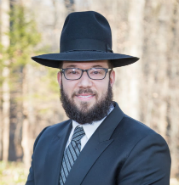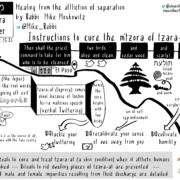Growing the Giving Nature of Love / Graceful Masculinity: Vayeitzei
Part of a year-long Torah series on graceful masculinity and Jewish values.
וַיַּעֲבֹד יַעֲקֹב בְּרָחֵל, שֶׁבַע שָׁנִים; וַיִּהְיוּ בְעֵינָיו כְּיָמִים אֲחָדִים, בְּאַהֲבָתוֹ אֹתָהּ.
Jacob worked seven years for Rachel and they seemed to him a few days because of his love for her. (Genesis 29:20)
There’s a story about a student who is accompanying his rabbi to a restaurant for dinner. After they are seated and have looked over the menu, the rabbi asks, “What would you like to eat?” Still scanning the options, the student responds, “I love fish, so…” The rabbi interrupts by gently lowering the student’s menu, makes eye contact, and corrects him: “If you really love fish, you would let it live out its life peacefully in the water. Instead, you are willing to pay someone to catch it, kill it, dice it, deep fry the pieces, and then you will eat it. You don’t love fish. You love the way eating fish makes you feel.”
Love can be selfish or selfless. We can love another, G-d forbid, for what the person can provide to us — or we can love by trying to offer as much as possible. In Hebrew, the world for “love” is אהבה. It comes from the root הב, which means to give. In the purest kind of love, we seek to better ourselves as a way of making the best possible offering to those we love.
In our parsha, the Torah testifies that Jacob’s love was for Rachel. Perhaps that is why the seven long years of labor felt like days for him. Moments waiting for a beloved can feel like an eternity, but Jacob was already achieving a sense of closeness in the moment by investing the time to work and refine himself. It is not coincidental that he, like many of our early leaders, was first a shepherd of animals before leading people. Putting the needs of others first isn’t easy, and it took effort to habituate themselves to accommodating the needs of the flock.
The Jerusalem Talmud teaches that we can best learn how to love another by learning to love ourselves and then expanding from there. In Tractate Nedarim, the Talmud explains the connection between the first half of the verse “You shall not seek revenge” with the second half of the verse, “You shall love your neighbor as yourself.” (Lev. 19:18) The Jerusalem Talmud presents a parable of a person who accidentally cut their finger while preparing food. Would the wounded hand take the knife and avenge itself by stabbing the hand that cut it? When we understand ourselves as being part of a greater whole, this not only discourages revenge, but it can inspire deep love. We are all commanded to love another the way that we love ourselves, but if we are not aware of the care we need to offer ourselves, we can end up hurting others.
Before we can expand our concern to include others, we need to understand our own needs. The way that we feel about ourselves can teach us how to properly feel for others. We must love ourselves in order to fully love someone else.
This is especially true in our most intimate relationships. Maimonides teaches that I must honor my partner even more than I honor myself and I should love my partner as much as I love myself.1 The source for this is the Babylonian Talmud, but it is noteworthy that the order there is reversed: One must love their partner the way one loves oneself and should honor the partner even more.2 The rabbis explain that Maimonides changes the order because he is offering practical advice on how to cultivate love for another. The first step is understanding and honoring what is important to the other, and making it important to you.
Tradition also acknowledges that desire is natural and powerful, and needs to be harnessed and channeled. The mystics understand the 613 commandments in the Torah as corresponding to 613 parts of our being. The commandment of loving another as we love ourselves is connected to the part of us that experiences desire. Intimate relationships offer the unique opportunity to focus on the needs of another, with as much sensitivity, as if those needs were one’s own. It is for this reason that the Talmud mandates that one see the other before marrying, to make sure there is an attraction. Torah’s imperative to love another as oneself is given as the prooftext.3
Jacob’s love for Rachel is passionate and generous. His work, both internal and external, models how we can find personal nourishment by focusing on the needs of another. G-d wants us to feel loved, and to know that we will never get there by exploiting others. Instead, we reach love through giving love in a healthy way.
Discussion questions:
How does the way society uses the word “love” affect our understanding of it?
What are some examples of micro-affections, small positive platonic acts, that we can offer through the day, especially to strangers?
If we feel good when we give and help others, why do we often feel resistance to giving more?
Is it more helpful to try and apply successful lessons in one’s partnership with G-d to human relationships, or apply lessons from our human relationships to our partnership with G-d?
1. וְכֵן צִוּוּ חֲכָמִים שֶׁיִּהְיֶה אָדָם מְכַבֵּד אֶת אִשְׁתּוֹ יוֹתֵר מִגּוּפוֹ וְאוֹהֲבָהּ כְּגוּפוֹ.↩
2. ת”ר האוהב את אשתו כגופו והמכבדה יותר מגופו ↩
3. There are more rational reasons to be attractive to one’s partner, as Maimonides writes: otherwise the partnership could end in graceleness, hate, or divorce. וְלֹא יְקַדֵּשׁ אִשָּׁה עַד שֶׁיִּרְאֶנָּה וְתִהְיֶה כְּשֵׁרָה בְּעֵינָיו שֶׁמָּא לֹא תִּמְצָא חֵן בְּעֵינָיו וְנִמְצָא מְגָרְשָׁהּ אוֹ שׁוֹכֵב עִמָּהּ וְהוּא שׂוֹנְאָהּ: ↩

By Rabbi Mike Moskowitz. Image from wallpapercave.com.
See other #MenschUp posts here.








